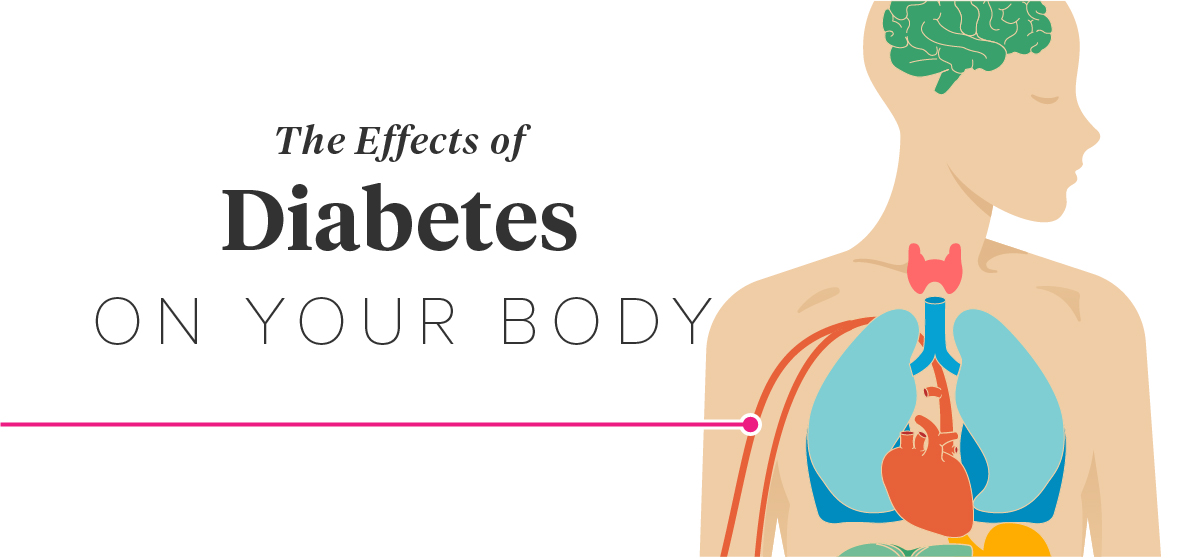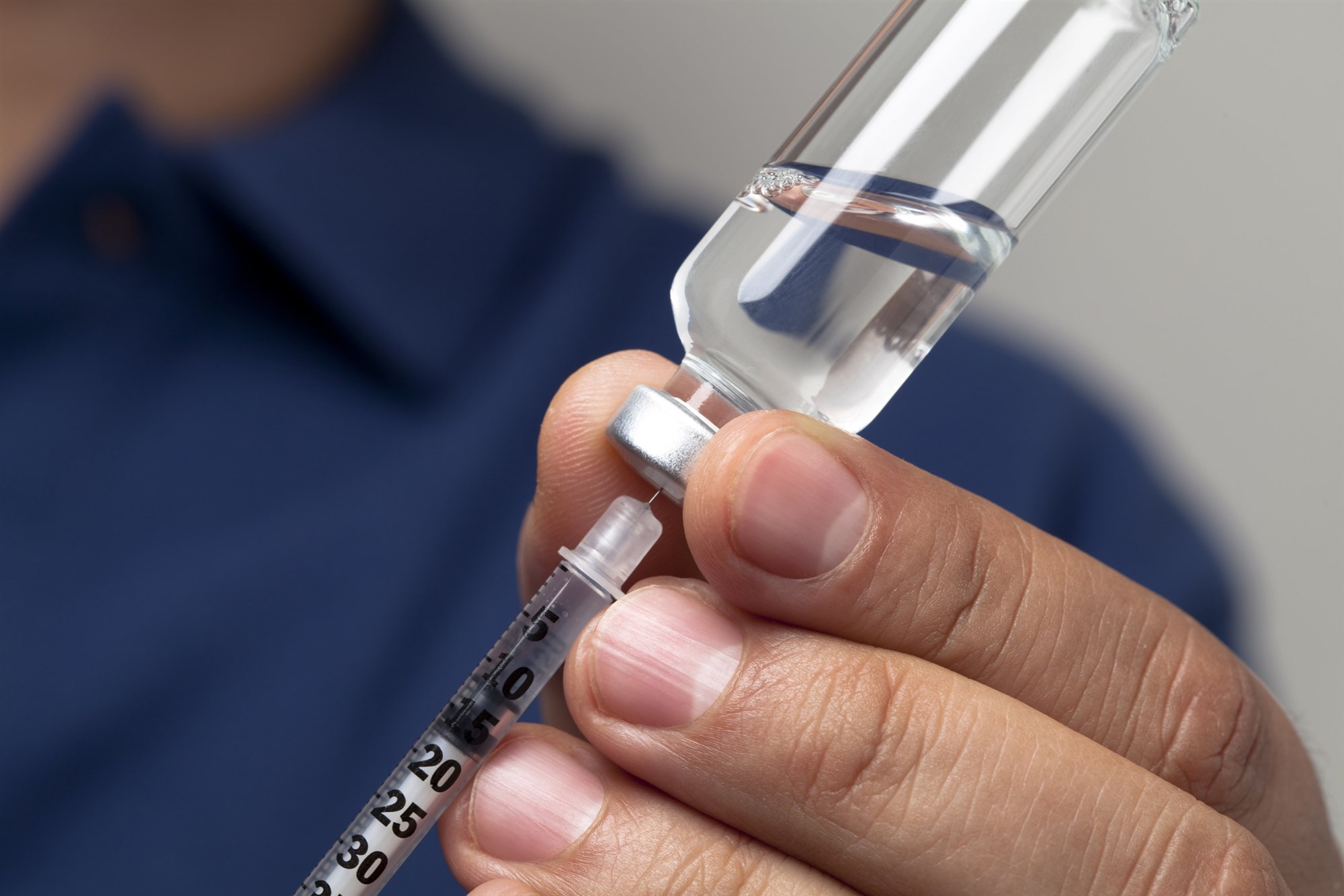Diabetes can be effectively managed when caught early. However, when left untreated, it can lead to potential complications that include heart disease, stroke, kidney damage, and nerve damage.
Normally after you eat or drink, your body will break down sugars from your food and use them for energy in your cells. To accomplish this, your pancreas needs to produce a hormone called insulin. Insulin is what facilitates the process of pulling sugar from the blood and putting it in the cells for use, or energy.
If you have diabetes, your pancreas either produces too little insulin or none at all. The insulin can’t be used effectively. This allows blood glucose levels to rise while the rest of your cells are deprived of much-needed energy. This can lead to a wide variety of problems affecting nearly every major body system.
Types of diabetes
The effects of diabetes on your body also depends on the type you have. There are two main types of diabetes: type 1 and type 2.
Type 1, also called juvenile diabetes or insulin-dependent diabetes, is an immune system disorder. Your own immune system attacks the insulin-producing cells in the pancreas, destroying your body’s ability to make insulin. With type 1 diabetes, you must take insulin to live. Most people are diagnosed as a child or young adult.
Type 2 is related to insulin resistance. It used to occur in older populations, but now more and more younger populations are being diagnosed with type 2 diabetes. This is a result of poor lifestyle, dietary, and exercise habits.
With type 2 diabetes, your pancreas stops using insulin effectively. This causes issues with being able to pull sugar from the blood and put it into the cells for energy. Eventually, this can lead to the need for insulin medication.
Gestational diabetes is high blood sugar that develops during pregnancy. Most of the time, you can control gestational diabetes through diet and exercise. It also typically resolves after the baby is delivered. Gestational diabetes can increase your risk for complications during pregnancy. It can also increase risk of type 2 diabetes development later in life for both mother and child.
Endocrine, excretory, and digestive systems
If your pancreas produces little or no insulin — or if your body can’t use it — alternate hormones are used to turn fat into energy. This can create high levels of toxic chemicals, including acids and ketone bodies, which may lead to a condition called diabetic ketoacidosis. This is a serious complication of the disease. Symptoms include extreme thirst, excessive urination, and fatigue.
Your breath may have a sweet scent that’s caused by the elevated levels of ketone bodies in the blood. High blood sugar levels and excess ketones in your urine can confirm diabetic ketoacidosis. If untreated, this condition can lead to loss of consciousness or even death.
Diabetic hyperglycemic hyperosmolar syndrome (HHS) occurs in type 2 diabetes. It involves very high blood glucose levels but no ketones. You might become dehydrated with this condition. You may even lose consciousness. HHS is most common in people whose diabetes is undiagnosed or who haven’t been able to control their diabetes. It can also be caused by a heart attack, stroke, or infection.
High blood glucose levels may cause gastroparesis — when it’s hard for your stomach to completely empty. This delay can cause blood glucose levels to rise. As a result, you may also experience nausea, vomiting, bloating, and heartburn.
Kidney damage
Diabetes can also damage your kidneys and affect their ability to filter waste products from your blood. If your doctor detects microalbuminuria, or elevated amounts of protein in your urine, it could be a sign that your kidneys aren’t functioning properly.
Kidney disease related to diabetes is called diabetic nephropathy. This condition doesn’t show symptoms until its later stages. If you have diabetes, your doctor will evaluate you for nephropathy to help prevent irreversible kidney damage or kidney failure.
Circulatory system
Diabetes raises your risk of developing high blood pressure, which puts further strain on your heart. When you have high blood glucose levels, this can contribute to the formation of fatty deposits in blood vessel walls. Over time, it can restrict blood flow and increase the risk of atherosclerosis, or hardening of the blood vessels.
According to the National Institute of Diabetes and Digestive and Kidney Diseases, diabetes doubles your risk of heart disease and stroke. In addition to monitoring and controlling your blood glucose, good eating habits and regular exercise can help lower the risk of high blood pressure and high cholesterol levels.
You should also consider quitting smoking if you’re at risk for diabetes. Diabetes and smoking are a very bad mix. It increases your risk for cardiovascular problems and restricted blood flow.
Lack of blood flow can eventually affect your hands and feet and cause pain while you’re walking. This is called intermittent claudication. The narrowed blood vessels in your legs and feet may also cause problems in those areas. For example, your feet may feel cold or you may be unable to feel heat due to lack of sensation. This condition is known as peripheral neuropathy, which is a type of diabetic neuropathy that causes decreased sensation in the extremities. It’s particularly dangerous because it may prevent you from noticing an injury or infection.
Diabetes also increases your risk of developing infections or ulcers of the foot. Poor blood flow and nerve damage increases the likelihood of having a foot or leg amputated. If you have diabetes, it’s critical that you take good care of your feet and inspect them often.
Integumentary system
Diabetes can also affect your skin, the largest organ of your body. Along with dehydration, your body’s lack of moisture due to high blood sugar can cause the skin on your feet to dry and crack. It’s important to completely dry your feet after bathing or swimming. You can use petroleum jelly or gentle creams, but avoid letting these areas become too moist.
Moist, warm folds in the skin are susceptible to fungal, bacterial, or yeast infections. These tend to develop between fingers and toes, the groin, armpits, or in the corners of your mouth. Symptoms include redness, blistering, and itchiness.
High-pressure spots under your foot can lead to calluses. These can become infected or develop ulcers. If you do get an ulcer, see your doctor immediately to lower the risk of losing your foot. You may also be more prone to boils, folliculitis (infection of the hair follicles), sties, and infected nails.
Unmanaged diabetes can also lead to three skin conditions:
- eruptive xanthomatosis, which causes hard yellow bumps with a red ring
- digital sclerosis, which causes thick skin, most often on the hands or feet
- diabetic dermopathy, which can cause brown patches on the skin
For diabetic dermopathy, there’s no cause for concern and no treatment is necessary.
These skin conditions usually clear up when you get your blood sugar under control.
Central nervous system
Diabetes causes diabetic neuropathy, or damage to the nerves. This can affect your perception of heat, cold, and pain. It can also make you more susceptible to injury. The chances that you won’t notice these injuries and let them develop into serious infections or conditions increases, too.
Diabetes can also lead to swollen, leaky blood vessels in the eye, called diabetic retinopathy. This can damage your vision. It may even lead to blindness. Symptoms of eye trouble can be mild at first, so it’s important to see your eye doctor regularly.
Reproductive system
The changing hormones during pregnancy can cause gestational diabetes and, in turn, increases your risk of high blood pressure. There are two types of high blood pressure conditions for pregnant women to watch out for, preeclampsia or eclampsia.
In most cases, gestational diabetes is easily controlled and glucose levels return to normal after the baby is born. Symptoms are similar to other types of diabetes, but may also include repeated infections affecting the vagina and bladder.
If you develop gestational diabetes, your baby may have a higher birth weight. This can make delivery more complicated. You’re also at an increased risk of developing type 2 diabetes several years following your baby’s delivery.
To learn more about diabetes, visit our topic center.





